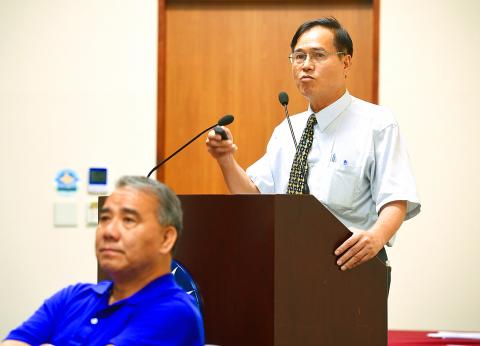Two Aboriginal Chinese Nationalist Party (KMT) legislators said the party should apologize to Aborigines for its past failures in protecting their cultural and economic rights, and for not responding to their demands for land rights.
KMT legislators Sufin Siluko (廖國棟) and Sra Kacaw (鄭天財) made the remarks at the party’s weekly Central Standing Committee meeting on Wednesday, where they presented a special report on transitional justice for Aborigines in Taiwan.
Siluko said that although former president Ma Ying-jeou (馬英九) introduced legislative reforms during his terms in office, Aborigines experienced significant erosion of their cultural heritage and language, continued economic exploitation and an absence of meaningful action for land rights throughout Ma’s administrations.

Photo: Lo Pei-der, Taipei Times
Siluko called on the KMT to issue a formal apology for its failures, convene representatives of Aboriginal groups to discuss a new Aboriginal policy platform and draft a bill that would enable Aborigines to reclaim land taken from them.
KMT Chairwoman Hung Hsiu-chu (洪秀柱) did not respond directly to Siluko and Kacaw’s report, saying instead that the party has “a sufficient understanding of, and the determination to, implement cultural pluralism and international human rights treaties and declarations on the rights of Aborigines.”
She added that the KMT had, under Ma, passed the Indigenous Peoples Basic Law (原住民族基本法), implemented the four-year NT$50 billion (US$1.55 billion) plan for infrastructure serving Aborigines, and managed an Aborigine combined development fund.
“Before it came into power last month, the Democratic Progressive Party [DPP] has said that Aborigines have suffered hundreds of years of deprivation, which had not been thoroughly reviewed or corrected during [Taiwan’s] democratization and that transitional justice should be promoted,” Hung said. “The DPP’s so-called transitional justice might appear correct, but it lacks substance and only misleads the public.”
She accused the DPP of stalling a bill in the legislature for Aboriginal self-rule, saying the DPP “does one thing and says another.”
She added that the KMT remains committed to promoting Aboriginal welfare through the legislation and that the party’s legislative caucus is to draft an Aboriginal policy platform.

MAKING WAVES: China’s maritime militia could become a nontraditional threat in war, clogging up shipping lanes to prevent US or Japanese intervention, a report said About 1,900 Chinese ships flying flags of convenience and fishing vessels that participated in China’s military exercises around Taiwan last month and in January have been listed for monitoring, Coast Guard Administration (CGA) Deputy Director-General Hsieh Ching-chin (謝慶欽) said yesterday. Following amendments to the Commercial Port Act (商港法) and the Law of Ships (船舶法) last month, the CGA can designate possible berthing areas or deny ports of call for vessels suspected of loitering around areas where undersea cables can be accessed, Oceans Affairs Council Minister Kuan Bi-ling (管碧玲) said. The list of suspected ships, originally 300, had risen to about 1,900 as

Japan’s strategic alliance with the US would collapse if Tokyo were to turn away from a conflict in Taiwan, Japanese Prime Minister Sanae Takaichi said yesterday, but distanced herself from previous comments that suggested a possible military response in such an event. Takaichi expressed her latest views on a nationally broadcast TV program late on Monday, where an opposition party leader criticized her for igniting tensions with China with the earlier remarks. Ties between Japan and China have sunk to the worst level in years after Takaichi said in November that a hypothetical Chinese attack on Taiwan could bring about a Japanese

MORE RESPONSIBILITY: Draftees would be expected to fight alongside professional soldiers, likely requiring the transformation of some training brigades into combat units The armed forces are to start incorporating new conscripts into combined arms brigades this year to enhance combat readiness, the Executive Yuan’s latest policy report said. The new policy would affect Taiwanese men entering the military for their compulsory service, which was extended to one year under reforms by then-president Tsai Ing-wen (蔡英文) in 2022. The conscripts would be trained to operate machine guns, uncrewed aerial vehicles, anti-tank guided missile launchers and Stinger air defense systems, the report said, adding that the basic training would be lengthened to eight weeks. After basic training, conscripts would be sorted into infantry battalions that would take

DEEP-STRIKE CAPABILITY: The scenario simulated a PLA drill that turned into an assault on Taiwan’s critical infrastructure, with the launchers providing fire support Taiwan yesterday conducted this year’s first military exercises at Longsiang Base in Taichung, demonstrating the newly acquired High Mobility Artillery Rocket System’s (HIMARS) ability to provide fire support and deep-strike capabilities. The scenario simulated an attack on Penghu County, with HIMARS trucks immediately rolling into designated launch areas and firing barrages at the Wangan (望安) and Cimei (七美) islands, simulating the provision of fire support against invading forces. The HIMARS are supposed to “fire and leave,” which would significantly increase personnel and equipment survivability, a military official said. The drill simulated an exercise launched by the Chinese People’s Liberation Army (PLA) Eastern